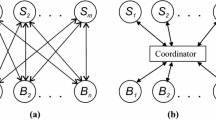Abstract
Most electronic marketplaces are derived from a client/server model, with a central coordinator institution in the middle and a closed group of market participants submitting bids and asks to that institution. In contrast, technical views on electronic commerce often envision ad-hoc cooperation between market participants in open and decentralized IT environments, where software agents negotiate for their human principals. Such environments will naturally form unregulated market-coordinated multi-agent systems with selfish agents negotiating for utility maximization, and they need concepts for decentralized economic coordination - a mechanism for distributed resource allocation that works without a market maker, with maximum privacy, security and coherent coordination as result. This article describes a framework used for the realization of a multiagent system which coordinates a supply chain using a decentralized economic approach.
Access this chapter
Tax calculation will be finalised at checkout
Purchases are for personal use only
Preview
Unable to display preview. Download preview PDF.
Similar content being viewed by others
References
RosettaNet Implementation Framework. RosettaNet Consortium. http://www.rosettanet.org, 2001. Access date: 2001-3-1.
Bigus, J. P. and Bigus, J. Constructing intelligent agents with Java: a programmer’s guide to smarter applications. New York: Wiley & Sons, 1997.
Binmore, K. Fun and games-a text on game theory. Lexington, Mass: D.C. Heath, 1992.
Böventer, E.v. and Illing, G. Einführung in die Mikroökonomie. München: Oldenbourg Verlag, 1995.
Dellarocas, C. and Klein, M. Civil Agent Societies: Tools for Inventing Open Agent-Mediated Electronic Marketplaces. Proceedings of the Workshop on Agent-Mediated Electronic Commerce. Stockholm, Sweden: ACM Press, 1999. http://citeseer.nj.nec.com/dellarocas99civil.html.
Downing, T. Java RMI remote method invocation. Foster City, CA: IDG Books Worldwide, 1998.
Eymann, T.: Avalanche-ein agentenbasierter dezentraler Koordinationsmechanismus für elektronische Märkte. Ph.D. Thesis. Albert-Ludwigs-Universität Freiburg, 2000. http://www.freidok.uni-freiburg.de/volltexte/147.
Eymann, T. Co-Evolution of Bargaining Strategies in a Decentralized Multi-Agent System. AAAI Fall 2001 Symposium on Negotiation Methods for Autonomous Cooperative Systems. Forthcoming.
FIPA-Foundation for Intelligent Physical Agents: Agent Communication Language. 1999. http://www.fipa.org
Guttman, R. and Maes, P. Agent-mediated Integrative Negotiation for Retail Electronic Commerce. Proceedings of the Workshop on Agent Mediated Electronic Trading (AMET’98). Minneapolis, Minnesota: 1998. http://ecommerce.media.mit.edu/papers/amet98_OnlinePDF.pdf.
Hardin, G.: The Tragedy of the Commons. In: Science 162 (1968) 1243–1248.
Hayek, F.A., Bartley, W. W., Klein, P. G., and Caldwell, B. The collected works of F.A. Hayek. Chicago: University of Chicago Press, 1989.
Huberman, B. A. and Hogg, T.: The behavior of computational ecologies. Huberman, B. A. (ed.). The Ecology of Computation, 77–115. Amsterdam: Elsevier (North Holland), 1988.
Kephart, J. O., Hanson, J. E., and Greenwald, A. R. Dynamic Pricing by Software Agents. IBM Research. http://www.research.ibm.com/infoecon/paps/html/rudin/rudin.html, 2001.
Klein, M.: Coordination Science: Challenges and Directions. Conen, W. and Neumann, G. (eds.). Coordination Technology for Collaborative Applications, 161–176. Heidelberg: Springer, 1997.
Kraus, S. Negotiation and cooperation in multi-agent environments. Artificial Intelligence, 94, (1997), 79–97. http://www.cs.biu.ac.il:8080/~sarit/Articles/ct.ps.
Malone, T. W. and Crowston, K. The Interdisciplinary Study of Coordination. ACM Computing Surveys, 26, 1 (1994), 87–119.
Menard, C. Markets as institutions versus organisations as markets? Disentangling some fundamental concepts. Journal of Economic Behavior and Organization, 28, (1995), 161–182.
Mirowski, P. J. More heat than light. Cambridge University Press, 1992.
Moulin, H. Cooperative microeconomics-a game-theoretic introduction. London: Prentice Hall, 1995.
Nelson, R. R. and Winter, S. G. Evolutionary Theory of Economic Change. Harvard University Press, 1985.
North, D. C. Institutionen, institutioneller Wandel und Wirtschaftsleistung. Tübingen: Mohr, 1998.
ObjectSpace. Voyager Documentation. Objectspace Website. http://www.objectspace.com/ products/voyager/, 1999. Access date: 2000-3-1.
Padovan, B., Sackmann, S., Eymann, T., and Pippow, I. A Prototype for an Agent-based Secure Electronic Marketplace including Reputation Tracking Mechanisms. Proceedings of the 34th Hawaiian International Conference on Systems Sciences. Outrigger Wailea Resort, Maui: IEEE Computer Society, 2001. http://www.hicss.hawaii.edu/ HICSS_34/PDFs/INBTB06_OnlinePDF.pdf.
Pruitt, D. G. Negotiation behavior. New York: Academic Press, 1981.
Rasmusson, L. and Janson, S. Agents, self-interest and electronic markets. Knowledge Engineering Review, 14, 2 (1999), 143–150.
Resnick, M. Turtles, termites, and traffic jams-explorations in massively parallel microworlds. Cambridge, Mass: MIT Press, 1994.
Rosenschein, J. S. and Zlotkin, G. Rules of encounter-designing conventions for automated negotiation among computers. Cambridge, Mass: MIT Press, 1994.
Sandholm, T. W. Issues in Computational Vickrey Auctions. International Journal of Electronic Commerce, 4, 3 (2000), 107–129.
Schmid, B. and Lindemann, M. Elements of a Reference Model for Electronic Markets. Proceedings of the 31st Hawaiian International Conference on Systems Sciences. Los Alamitos, CA: IEEE Press, 1998.
Shoven, J. and Walley, J. Applied General-Equilibrium Models of Taxation and International Trade: An Introduction and Survey. Journal of Economic Literature, 22, September 1984 (1984), 1007–1051.
Sierra, C.: A roadmap for Agent-Mediated Electronic Commerce. Sierra, C. and Dignum, F. (eds.). Agent Mediated Electronic Commerce-The European AgentLink Perspective. Heidelberg: Springer, 2001.
Smith, A. An inquiry into the nature and causes of the wealth of nations. London: Printed for W. Strahan; and T. Cadell, 1776.
Tanenbaum, A. S. Computer networks. Upper Saddle River, N.J: Prentice Hall PTR, 1996.
Tesch, T. and Fankhauser, P.: Arbitration and Matchmaking for Agents with Conflicting Interests. Klusch, M. (ed.). Proceedings of Third International Workshop on Cooperative Information Agents (CIA’99), 323–334. Heidelberg: Springer, 1999.
Thomas, J. and Sycara, K. Stability and heterogeneity in multi agent systems. Proceedings of the Third International Conference on Multi-Agent Systems (ICMAS-98). Paris, France: 1998.
Walras, L. Elements of pure economics. London: Allen and Unwin, 1954.
Wellman, M. P.: Market-Oriented Programming: Some Early Lessons. Clearwater, S. H. (ed.). Market-Based Control: A Paradigm for Distributed Resource Allocation, 74–95. Singapore: World Scientific, 1996.
Author information
Authors and Affiliations
Editor information
Editors and Affiliations
Rights and permissions
Copyright information
© 2001 Springer-Verlag Berlin Heidelberg
About this paper
Cite this paper
Eymann, T. (2001). Markets without Makers - A Framework for Decentralized Economic Coordination in Multiagent Systems. In: Fiege, L., Mühl, G., Wilhelm, U. (eds) Electronic Commerce. WELCOM 2001. Lecture Notes in Computer Science, vol 2232. Springer, Berlin, Heidelberg. https://doi.org/10.1007/3-540-45598-1_8
Download citation
DOI: https://doi.org/10.1007/3-540-45598-1_8
Published:
Publisher Name: Springer, Berlin, Heidelberg
Print ISBN: 978-3-540-42878-7
Online ISBN: 978-3-540-45598-1
eBook Packages: Springer Book Archive




